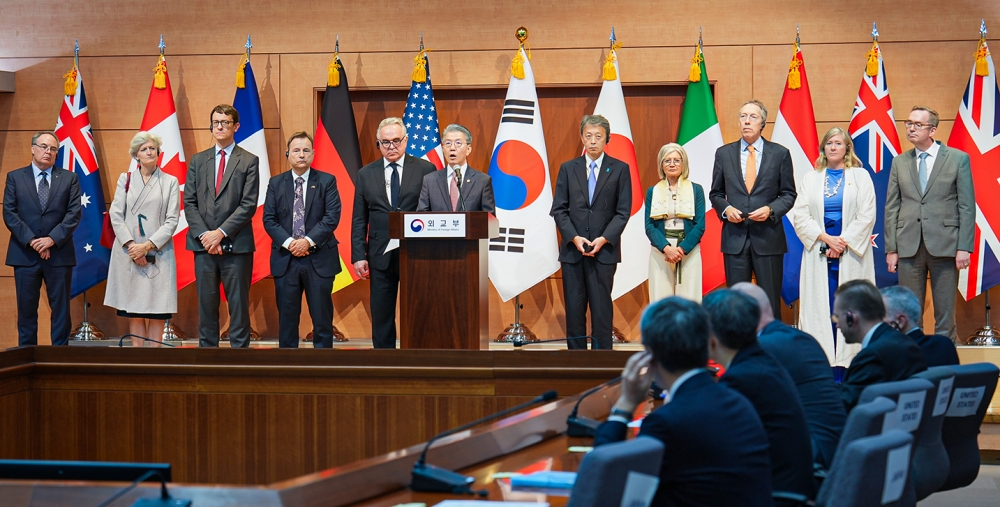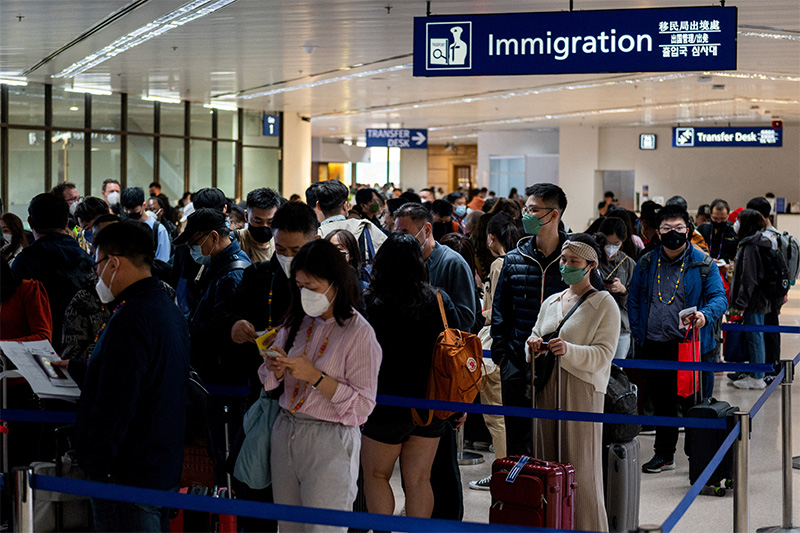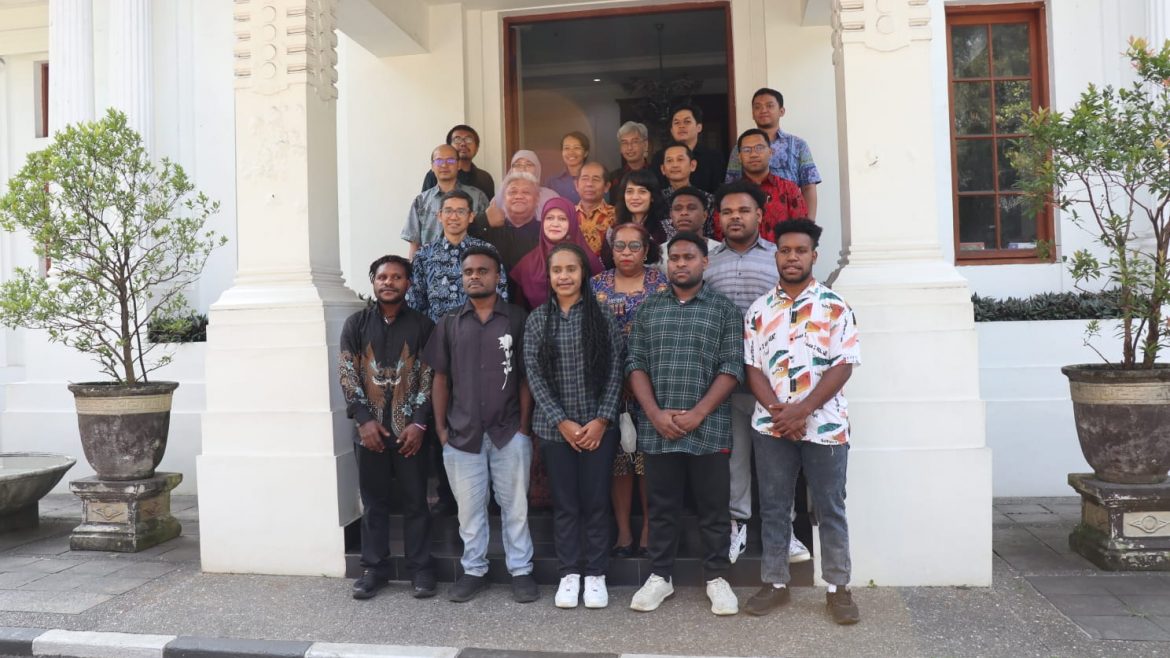
07 Nov, 2025
4 min read
US, Japan, and South Korea Strengthen Trilateral Partnership on Security and Economic Cooperation
Senior representatives from the United States, Japan, and South Korea gathered in New York on Sunday to reaffirm their trilateral partnership and enhance cooperation on regional security, economic stability, and global challenges, according to a joint statement issued by the three governments.
U.S. Secretary of State Marco Rubio, Japanese Foreign Minister Iwaya Takeshi, and South Korean Foreign Minister Cho Hyun conducted discussions on the margins of the United Nations General Assembly to advance their shared strategic objectives across the Indo-Pacific and beyond.
The three allies emphasized their dedication to ensuring the safety, security, and prosperity of their respective countries and the wider Indo-Pacific region, underscoring adherence to international law and the rule of law.
Enhanced Security Commitments
The United States reaffirmed its "ironclad" defense obligations toward Japan and South Korea, including extended deterrence supported by its comprehensive military capabilities, notably its nuclear arsenal.
The officials committed to expanding trilateral security collaboration through regular joint exercises such as the multi-domain "Freedom Edge" drills and improving both individual and collective defense capabilities.
New initiatives focusing on coast guard cooperation and maritime security were announced, particularly aimed at supporting ASEAN member states and countering unlawful maritime claims in the South China Sea.
The joint statement condemned efforts to alter the regional status quo and reiterated support for international maritime law under the United Nations Convention on the Law of the Sea.
Concerns were expressed regarding escalating tensions in the Taiwan Strait, with the three governments urging a peaceful resolution of cross-Strait issues and endorsing Taiwan's participation in international organizations.
Unified Approach to North Korean Threats
The trilateral partners reiterated their unified goal of achieving the "complete denuclearization" of North Korea in accordance with United Nations Security Council resolutions.
They voiced serious concerns about increasing military cooperation between North Korea and Russia, particularly concerning missile development, calling for an immediate cessation of these activities.
Additionally, the officials highlighted worries about North Korea's cyber operations, including the deployment of overseas IT workers, and welcomed coordinated efforts to counter such threats.
Continued collaboration is planned through the Trilateral Diplomatic Working Group on North Korean Cyber Threats.
The partners also emphasized the importance of resolving longstanding humanitarian issues, focusing on abductees, detainees, and separated families.
Advancing Economic and Technological Resilience
The leaders pledged to deepen collaboration in critical areas such as supply chain security, emerging technologies—including artificial intelligence, quantum computing, and biotechnology—and clean energy initiatives.
The statement noted, "The Secretary and Foreign Ministers committed to advance trilateral cooperation on supply chain resilience, digital infrastructure, artificial intelligence, quantum, biotechnology, and other emerging technologies."
Dialogue on critical minerals will be intensified, alongside strengthened cooperation in regions like Southeast Asia and Sub-Saharan Africa through the trilateral Early Warning System.
In the energy sector, the trio committed to joint development of advanced civil nuclear reactors and enhancing energy security through diversified resources, including increased access to U.S. liquefied natural gas.
Recent initiatives such as the Trilateral Workshops on Quantum Industrial Security and joint technology training programs received strong endorsement, alongside reaffirmed support for ongoing research sharing among national laboratories.
The leaders also voiced strong opposition to economic coercion and unfair trade practices that could disrupt global supply chains.
As underscored in the statement, "Standing firmly against economic coercion and non-market policies and practices, including export restrictions that could lead to significant supply chain disruptions, they reaffirmed their commitment to a free and fair global economic order."
They further expressed anticipation of South Korea's upcoming role as host of the Asia-Pacific Economic Cooperation (APEC) summit in 2025.
The three officials reaffirmed the critical role of the Trilateral Coordinating Secretariat in driving joint initiatives and committed to maintaining trilateral engagements at all levels to support their shared objectives.
"The Secretary and Foreign Ministers welcomed the active role of the Trilateral Coordinating Secretariat responsible for aligning the action-oriented objectives and coordinating and implementing tangible efforts. They committed to continue trilateral meetings at all levels," the statement concluded.
Recommended For You

Philippines Maintains Status as World’s Most Disaster-Prone Nation Amid Corruption and Climate Challenges
Nov 07, 2025
Apolinario Tiamzon

Pasay Court Sentences Woman to Over Three Years for Using Fake Immigration Stamp
Nov 07, 2025
Apolinario Tiamzon

Puregold Launches First Store in Antique to Stimulate Local Economy and Employment
Nov 07, 2025
Visitacion Quibuyen

DOT Launches Senior Citizen Tour Guide Training Program in Intramuros
Nov 07, 2025
Gregoria Sumulong
